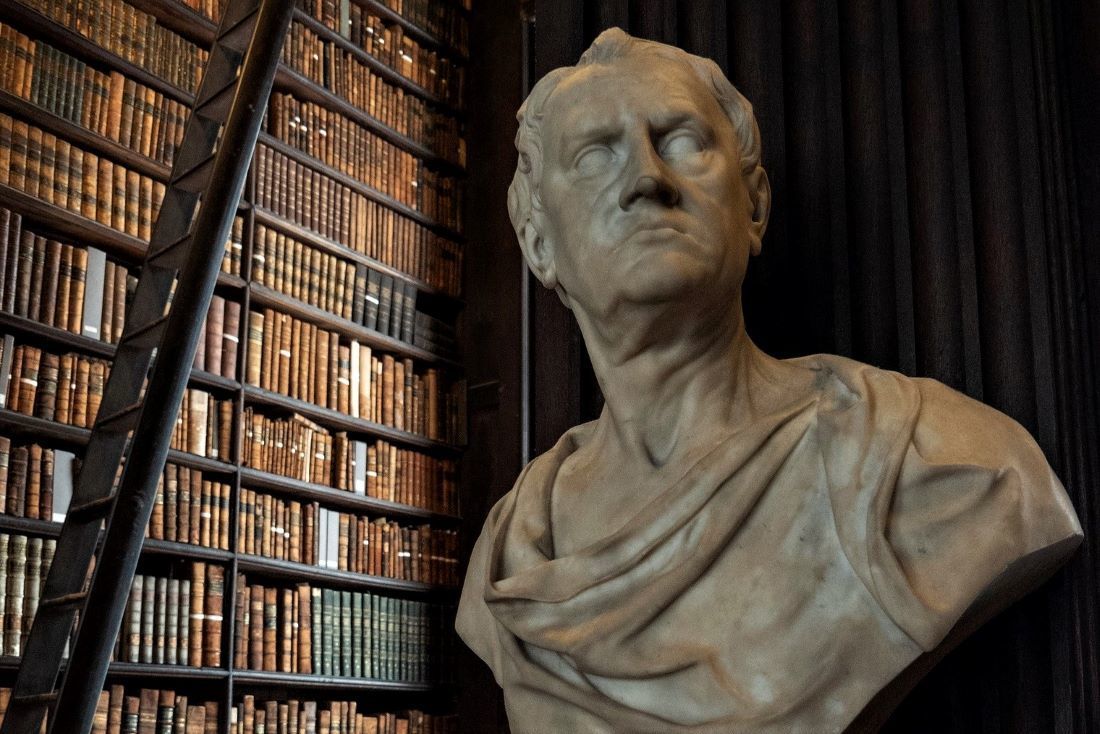Aristotle's contribution to the Western intellectual tradition is unparalleled. Not only did he found two novel fields of inquiry—formal logic and the science of biology—he also produced work of the highest order across the full breadth of disciplines already in place: ethics, metaphysics, psychology, physics, economics, rhetoric, and dozens more.
These accomplishments, impressive as they are, do not entirely account for Aristotle’s unrivaled influence. Beginning in late antiquity, Aristotle’s work occupied an unusually prominent position within the dominant strains of European, Byzantine, Jewish, and Arabic philosophy that followed. For nearly 1500 years, Aristotle’s problems set the agenda, his theories provided the conceptual framework, his prescribed methods shaped the inquiries, and his logic governed the arguments. Aristotle’s stature was so elevated among Medieval Arabic philosophers that they refer to him simply as “The First Teacher.” Thomas Aquinas, in a similar spirit, speaks only of “The Philosopher.” And Dante could write about “the master of those who know” confident his audience would discern whom he describes.
This brief résumé, if nothing else, depicts a philosopher of remarkable ability. But no level of philosophical acumen, not even one commensurate with Aristotle’s outsized reputation, inoculates one from error. We have learned a great deal about the world in the nearly two and a half millennia since Aristotle lived. Within Aristotle’s surviving works, littered among the myriad insights that continue to inspire philosophers today, are hundreds of claims we now know are simply false. Most of these false claims are easily forgiven. We do not fault Aristotle for only placing four elements on his periodic table or for believing that the brain’s principal function is to cool the blood. When it comes to errors like these, we share Aristotle’s fate. Much of what each and every one of us professes to know will be risibly false in the eyes of future generations.
But not every kind of error deserves this sanguine reception. Some things Aristotle says are not just wrong, they are straightforwardly immoral. Perhaps the most infamous example is Aristotle’s claim that “from the hour of their birth, some are marked out for subjection, others for rule” (Pol. I.5, 1054a22-23). Aristotle does not simply endorse natural slavery; he expends significant effort arguing that it is “both expedient and right” (1054a18). Here, Aristotle’s enormous influence works against him. Scores of philosophers and theologians accepted Aristotle’s conclusion and advanced modified versions of his arguments. And appeals to Aristotle’s authority frequently buoyed the cause of those committed to chattel slavery’s continuation.[1]
What are we to do with arguments like these? Perhaps the best response is condemnation and cursory dismissal. If the only plausible outcome of continued engagement with an argument is the perpetuation of the harms it has already caused, then proscription may be warranted. What could we possibly gain by seriously studying unsound arguments for uncontroversially repugnant and objectively harmful views?
I contend that, at least in this case, the gains are not trivial. What we can learn is surprising. It is, moreover, directly relevant to understanding matters of great importance that concern us today. To show this is a gamble of sorts. I must transgress the plausibly acceptable boundaries in question and discuss Aristotle’s arguments themselves.
Aristotle begins his argument for natural slavery by observing that some human beings are simply incapable of engaging in successful practical reasoning. Aristotle is not describing the relatively familiar rational failures of the weak-willed or the vicious. He is talking about people “who participate in reason enough to apprehend, but not to have” (I.5, 1054b21-22). Such a person can understand what others say and can follow simple instructions, but they are incapable of rationally deliberating in a way that would lead them to pursue anything beyond what their bodily passions and appetites incline them to do. To say that one can be in this condition by nature is in part to claim that it can occur congenitally. The intellectual impairments that constitute this congenital condition are extensive and severe; the impairments are so severe one can say that they these individuals have “no deliberative faculty at all” (I.13, 1260a12).
Aristotle then invokes a general proposition. If someone is not in a position to exercise their rational practical faculties well, it would be better for them to do what a superior practical reasoner tells them to do than to rely on their own abilities. There are obviously many occasions when it would be good to defer to others and substitute their practical judgments for your own. If you could ever find someone who is practically wise, their advice, I presume, would often be worth following. This is especially so when you are aware that you have developed vicious habits. If you are intemperate, you can still be guided to perform the act a temperate person would perform, even if you are not able to do so in the manner that a temperate person would perform it (viz. temperately). There are, for Aristotle, all sorts of relationships for which this kind of practical deference is central. For example, it is better for children to follow their parents’ judgments about what to do than their own.
To offload one's practical reasoning to another is, according to Aristotle, to be ruled by them. Though contemporary ears may bristle upon hearing the labels “ruler” and “ruled,” for two individuals to be related in this manner is not, on its own, to describe something that is either uncommon or unjust. As we have just noted, Aristotle views the relationship between parent and child as an instance of this dynamic. Another unproblematic instance occurs when a member of a mendicant order professes the counsels of perfection and thereby vows obedience to their superior. It is not implausible to view quite general structures, say, the relationship between a government’s laws and its citizens, in a parallel way. So, if Aristotle is right, then the severely cognitively impaired individuals he has identified would benefit from deferring practically to individuals who are not similarly impaired. For in general, it is better to have someone else rule you than to have your body (and the passions) rule your soul (and reason).
If Aristotle ended his argument here, it is possible that his views could be redeemed. Perhaps the practical deference required of those who are, by nature, incapable of sound practical deliberation need not be total. If so, they could retain some modicum of self-determination and avoid the kind of absolute (or despotic) rule Aristotle recommends. And there may be other ways to organize the beneficial relationships of practical dependency that do not involve the stark inequalities Aristotle describes: communities, say, in which both those in need and those who are not in need view themselves as equal participants in a shared project of interdependent living. In this way “subjugation” can be reformed into a legitimate, perhaps even commendable, variety of “caretaking.”
Unfortunately, Aristotle did not stop here. He goes on to argue that the relation between ruler and ruled that is justified in these cases is in fact a much narrower relation, namely, that between master and slave. And Aristotle’s conception of slavery, we will see, involves commitments that place its application here beyond redemption.
Before descending into his argument’s final stages, I would like to pause to note something surprising about how it has unfolded thus far. Most people, before they read Aristotle’s argument, assume that he defends the kinds of slavery that were actually practiced in Athens during his lifetime. If this were so, Aristotle would be subject to one or more of the “modern” charges of racism, colonialism, or xenophobia. Each of these epithets is, of course, anachronistic. Nevertheless, what Aristotle says undermines them all.
First, Aristotle is clear that the conditions that would render one a natural slave are conditions of the soul. But the relevant deficiencies in someone’s soul do not reliably correspond to “the forms of their bodies” (I.5, 1254b35). That is, we cannot use any of an individual’s bodily features to discern whether they are naturally suited for slavery. Second, Aristotle denies that being conquered in war justifies being enslaved by the victors. For not all wars are just and, even when they are, the excellences needed to be victorious in war (e.g. strength) do not entail the excellences that would qualify one to be a ruler or master (e.g. wisdom and virtue). Finally, though Aristotle has many disparaging things to say about foreign, non-Hellenic peoples—which he refers to collectively as “barbarians”—he argues that one’s status as a master or a slave (or neither) is not made relative to one’s country.
So Aristotle argues against the only varieties of slavery that he would have actually encountered and, in doing so, eliminates racism, colonialism, and xenophobia as sources of slavery’s legitimacy. But there remains one modern accusation that Aristotle’s argument for natural slavery does not avoid. Though not initially obvious, what mars Aristotle’s argument, what is, in fact, absolutely central to it, is a pernicious form of ableism. This becomes clear once we see how Aristotle conceives slavery itself.
Aristotle’s account of slavery comprises two interrelated characterizations. A slave is property and a slave is a living instrument or tool. According to Aristotle, all of one’s actions ultimately occur for the sake of a single end. This end, the good which one pursues when one acts, is determined by what one is, by one’s form. When someone becomes a tool in the way that property can be, their actions cease being directed towards their own human ends. That is, a slave's actions no longer occur for the sake of their own good; they occur only for the sake of another’s good, namely, their master’s. Aristotle takes the classification of the slave as a living tool seriously. As a good hammer facilitates the craftsman attaining their ends, so a good slave facilitates the master attaining theirs. But the only variety of goodness that is applicable in this comparison is entirely instrumental. To be a good slave is to act in a way that enables their master to live a noble and flourishing life.
Though slaves still possess a human form, their actions are no longer ways to realize their human good. There is, therefore, an important sense in which a slave ceases to live a human life altogether. A slave’s life is no longer their own; whatever they do belongs to (i.e. is literally a part of) their master’s life. For “the interests of part and whole, of body and soul, are the same, and the slave is a part of the master, a living but separated part of his bodily frame” (I.6, 1255b10-12).
To claim, then, as Aristotle does, that enslavement benefits the natural slave is borderline incoherent. Enslavement cannot be good for the slave when considered as the human beings they are. For “the master as such is concerned . . . with the use of slaves” (I.7, 1255b30-33). A master improves their slaves as a butcher sharpens their knives; the only benefits they impart are those that enhance utility.
To be property, a living tool, and a mere part of their master’s life goes far beyond the kind of practical deference Aristotle describes. And nothing Aristotle says justifies subjugation to a kind of rule that goes beyond such deference. So Aristotle’s argument for natural slavery fails. Moreover, it does so by adhering to a variety of ableism, broadly construed, that we correctly consider repugnant. The idea that it is sometimes better to follow the sage advice of the wise is transformed into the view that individuals who do not meet some threshold of "proper functioning" would be better off giving up on living rational human lives altogether. Aristotle separates the severely cognitively disabled from their very humanity. Justice only occurs within a community of individuals equally engaged in lives of human excellence. To separate the cognitively disabled from their human form is to place them beyond justice’s reach.[2]
Aristotle’s argument violates what we might call the principle of human equality. However, the variety of inegalitarianism he adopts in rejecting this principle is not what most would expect it to be. There is certainly value in understanding why a bad argument fails. But what we learn by engaging Aristotle’s argument for natural slavery is not narrowly historical. We can appreciate its further import by observing that the crux of Aristotle’s argument is still frequently accepted today.
This acceptance is commonly found in philosophical appeals to personhood. To be a person is to possess and to be able to exercise (or exercise well) one or more rational capacities. The rational capacity that is most often taken to be central to personhood is a capacity for self-consciousness. To be a person, one must be able to conceive of oneself as a self—as a single, unified, temporally-continuous subject and source of both rational thought and agency. It is by being a person that one becomes morally salient. To be a person is to have an intrinsic moral status; only persons can be possible subjects of justice and injustice.[3]
This yoking of moral consideration to an individual’s cognitive abilities rather than to their status as human beings, parallels Aristotle’s treatment of the cognitively disabled. For example, Peter Singer maintains that “being a human being, in the sense of a member of the species Homo sapiens, is not relevant to the wrongness of killing it; instead, characteristics like rationality, autonomy and self-awareness make a difference.” If an individual human being lacks these rational characteristics, as the severely cognitively disabled may, Singer says “Killing them, therefore, cannot be equated with killing normal human beings or any other self-aware beings.”[4] If severe cognitive disability places one outside the domain of morality and justice, then neither enslavement, nor killing, nor any other treatment is proscribed.
Singer’s philosophical ableism has received occasional condemnation. But the conception of personhood he adopts finds welcome application in many controversial areas. It is invoked, for example, in discussions about how we should treat individuals in a persistent “vegetative” state and in discussions about whether euthanasia is permissible for those with severe Alzheimer’s or dementia. And it is commonplace in discussions about how we should treat the lives of human beings in utero.
There is a certain irony, albeit a dark one, in the fact that many who would rightly classify Aristotle’s argument for natural slavery as unqualifiedly immoral nevertheless accept its central and most objectionable premise. We need to understand better how matters of justice are tied to one’s status as a human being and how they are tied to one’s cognitive abilities. Aristotle’s argument for natural slavery is instructive; it shows vividly how the inegalitarian rejection of our shared humanity as an inviolable source of moral consideration can lead one down paths that no one should follow.
[1] The invocation of Aristotle was especially widespread among proponents of slavery in the American South in the eighteenth and nineteenth centuries. David Brion Davis, Inhuman Bondage: The Rise and Fall of Slavery in the New World (Oxford: OUP, 2006), includes an illuminating discussion of Aristotle’s role in these arguments.
[2] For discussions about how conceptions of disability developed during the period of Aristotle’s greatest influence, see Irina Metzler, Fools and Idiots?: Intellectual Disability in the Middle Ages (Manchester University Press, 2016) and Scott M. Williams (ed.) Disability in Medieval Christian Philosophy and Theology (Routledge, 2020).
[3] This conception of personhood can be traced at least as far back as Locke, but finds its most famous expression in Kant: “Beings whose existence rests not indeed on our will but on nature, if they are non-rational beings, still have only a relative worth, as means, and are therefore called things, whereas rational beings are called persons, because their nature already marks them out as ends in themselves” (Groundwork for the Metaphysics of Morals, 428)
[4] Peter Singer, Practical Ethics, 3rd ed. (Cambridge University Press, 2011), p. 160.


